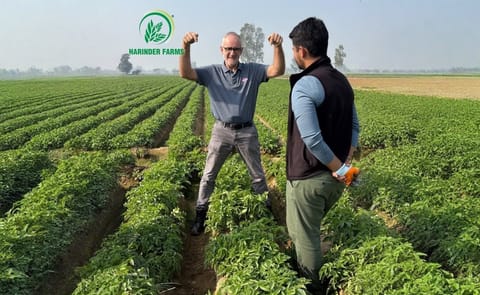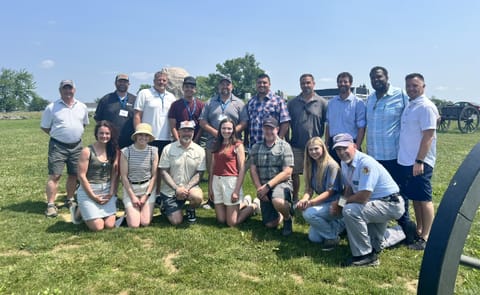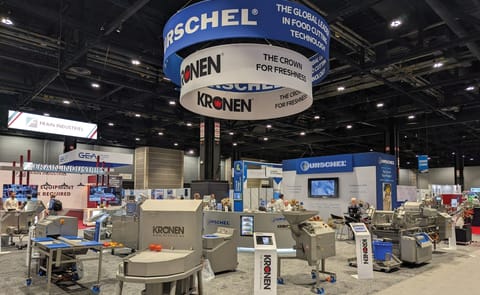MSU has long helped potato growers in Michigan and around the globe. Photo illustration courtesy of MSU
Major US project to improve potato production in Bangladesh and Indonesia led by MSU

The U.S. Agency for International Development has awarded Michigan State University (MSU) a $5.8 million cooperative agreement to improve potato production in Bangladesh and Indonesia. The grant supports USAID’s work under Feed the Future, the U.S. government’s global hunger and food security initiative.
As part of the Feed the Future Biotechnology Partnership Project, MSU will partner with the University of Minnesota and Idaho-based J.R. Simplot Comp., along with in-country partners in both Bangladesh and Indonesia, to make improved potato varieties available to smallholder farmers. Such varieties can help protect against yield loss and improve livelihoods for those who depend on the crop to survive.
Genetic Engineering
“Genetically engineered crops are among the technologies with potential to increase agricultural productivity, benefiting livelihoods of both small-scale and commercial farmers, while reducing inputs and environmental impacts,” said Dave Douches, who leads MSU’s Potato Breeding and Genetics program. “Internationally, potatoes are the world’s third-largest food crop. So our team is committed to developing new varieties, finding potatoes that result in reduced pesticide use and more sustainable growing methods, and exploring ways to enhance the nutritional value of the potato.”
Late Blight
Late blight, the disease responsible for the historic Irish potato famine, is caused by a fungus-like pathogen and still has the potential to wreak havoc on today’s potato and tomato crops. To fight the disease, and subsequently increase Bangladesh’s and Indonesia’s food security, the researchers will work with in-country partners to assess the validity of genetically engineered varieties, along with other approaches such as conventional fungicides, to develop the most-sustainable approach to maintain this important crop.
Developing genetically engineered crops to adapt to drought, temperature extremes and pests is not new. They have been in use for nearly 20 years and are planted in 27 countries on 433 million acres by 18 million farmers, 90 percent of whom were smallholder farmers in developing countries.
Genetic engineering can be utilized to overcome challenges that traditional breeding has been unable to address. It also can hasten the development of new resilient crop varieties made available to farmers in developing countries. Already, farmers in Bangladesh are growing a pest-resistant genetically engineered eggplant, dramatically reducing the number of pesticide sprays.
In Bangladesh and Indonesia, the interdisciplinary nature of the initiative is the key to making it all work, said Douches.
Project Partners
“This partnership combines MSU’s biotechnology pathology and potato breeding skills and the public sector regulatory skills from the University of Minnesota with the product development, commercialization and regulatory skills of J.R. Simplot Co.,” Douches said. “This, combined with the agricultural expertise of the in-county partner institutions, provides a public-private partnership that is aptly positioned to deliver a potato that’s resistant to late blight.”
Feed the Future
Feed the Future is the U.S. government’s global hunger and food security initiative. With a focus on smallholder farmers, particularly women, Feed the Future supports partner countries in developing their agriculture sectors to spur economic growth and trade that increase incomes and reduce hunger, poverty and undernutrition.
For more information, visit www.feedthefuture.gov.
As part of the Feed the Future Biotechnology Partnership Project, MSU will partner with the University of Minnesota and Idaho-based J.R. Simplot Comp., along with in-country partners in both Bangladesh and Indonesia, to make improved potato varieties available to smallholder farmers. Such varieties can help protect against yield loss and improve livelihoods for those who depend on the crop to survive.
Genetic Engineering
“Genetically engineered crops are among the technologies with potential to increase agricultural productivity, benefiting livelihoods of both small-scale and commercial farmers, while reducing inputs and environmental impacts,” said Dave Douches, who leads MSU’s Potato Breeding and Genetics program. “Internationally, potatoes are the world’s third-largest food crop. So our team is committed to developing new varieties, finding potatoes that result in reduced pesticide use and more sustainable growing methods, and exploring ways to enhance the nutritional value of the potato.”
Late Blight
Late blight, the disease responsible for the historic Irish potato famine, is caused by a fungus-like pathogen and still has the potential to wreak havoc on today’s potato and tomato crops. To fight the disease, and subsequently increase Bangladesh’s and Indonesia’s food security, the researchers will work with in-country partners to assess the validity of genetically engineered varieties, along with other approaches such as conventional fungicides, to develop the most-sustainable approach to maintain this important crop.
Developing genetically engineered crops to adapt to drought, temperature extremes and pests is not new. They have been in use for nearly 20 years and are planted in 27 countries on 433 million acres by 18 million farmers, 90 percent of whom were smallholder farmers in developing countries.
Genetic engineering can be utilized to overcome challenges that traditional breeding has been unable to address. It also can hasten the development of new resilient crop varieties made available to farmers in developing countries. Already, farmers in Bangladesh are growing a pest-resistant genetically engineered eggplant, dramatically reducing the number of pesticide sprays.
In Bangladesh and Indonesia, the interdisciplinary nature of the initiative is the key to making it all work, said Douches.
Project Partners
“This partnership combines MSU’s biotechnology pathology and potato breeding skills and the public sector regulatory skills from the University of Minnesota with the product development, commercialization and regulatory skills of J.R. Simplot Co.,” Douches said. “This, combined with the agricultural expertise of the in-county partner institutions, provides a public-private partnership that is aptly positioned to deliver a potato that’s resistant to late blight.”
Feed the Future
Feed the Future is the U.S. government’s global hunger and food security initiative. With a focus on smallholder farmers, particularly women, Feed the Future supports partner countries in developing their agriculture sectors to spur economic growth and trade that increase incomes and reduce hunger, poverty and undernutrition.
For more information, visit www.feedthefuture.gov.
¿Te gustaría recibir noticias como esta por correo electrónico? ¡Únete y suscríbete!
Get the latest potato industry news straight to your WhatsApp. Join the PotatoPro WhatsApp Community!
Empresa Destacada
Contenido Patrocinado
Contenido Patrocinado
Contenido Patrocinado
Contenido Patrocinado











